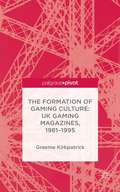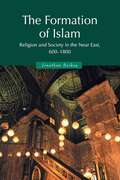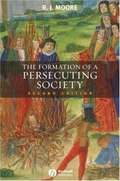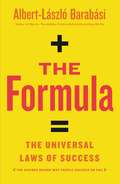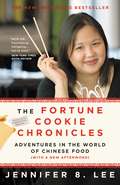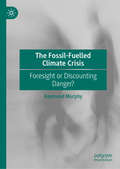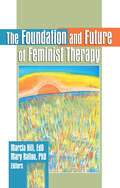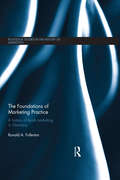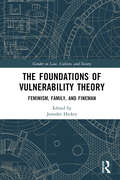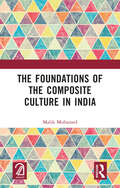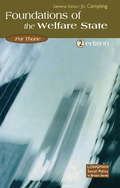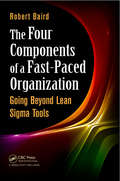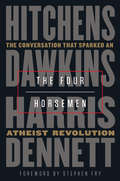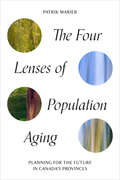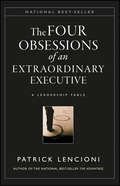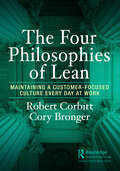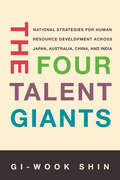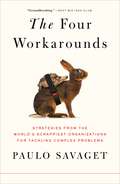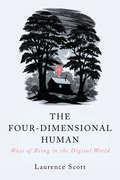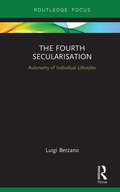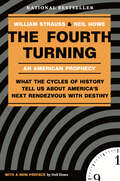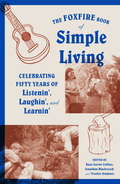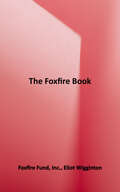- Table View
- List View
The Formation of Gaming Culture: UK Gaming Magazines, 1981–1995
by Graeme KirkpatrickThis book analyses gaming magazines published in Britain in the 1980s to provide the first serious history of the bedroom coding culture that produced some of the most important video games ever played.
The Formation of Islam: Religion and Society in the Near East, 600-1800 (Themes in Islamic History #Number Two)
by Patricia Crone Jonathan P. BerkeyJonathan Berkey surveys the religious history of the peoples of the Near East from approximately 600 to 1800 c.e. After examining the religious scene in the Near East in late antiquity, he investigates Islam's first century, the "classical" period from the accession of the Abbasids to the rise of the Buyid amirs. He then traces the emergence of new forms of Islam in the middle period, deftly showing how Islam emerged slowly as part of a prolonged process.
The Formation of Papal Authority in Late Antique Italy
by Kristina SessaThis book is the first cultural history of papal authority in late antiquity. While most traditional histories posit a 'rise of the papacy' and examine popes as politicians, theologians and civic leaders, Kristina Sessa focuses on the late Roman household and its critical role in the development of the Roman church from c.350-600. She argues that Rome's bishops adopted the ancient elite household as a model of good government for leading the church. Central to this phenomenon was the classical and biblical figure of the steward, the householder's appointed agent who oversaw his property and people. As stewards of God, Roman bishops endeavored to exercise moral and material influence within both the pope's own administration and the households of Italy's clergy and lay elites. This original and nuanced study charts their manifold interactions with late Roman households and shows how bishops used domestic knowledge as the basis for establishing their authority as Italy's singular religious leaders.
The Formation of a Persecuting Society Authority and Deviance in Western Europe 950-1250, Second Edition
by R. I. MooreThe tenth to the thirteenth centuries in Europe saw the appearance of popular heresy and the establishment of the Inquisition, the expropriation and mass murder of Jews, and the propagation of elaborate measures to segregate lepers from the healthy and curtail their civil rights. In this book, R. I. Moore argues that the coincidences in the treatment of these and other minority groups cannot be explained independently, and that all are part of a pattern of persecution which now appeared for the first time to make Europe become, as it has remained, a persecuting society.
The Formula: The Universal Laws of Success
by Albert-László Barabási"This is not just an important but an imperative project: to approach the problem of randomness and success using the state of the art scientific arsenal we have. Barabasi is the person."--Nassim Nicholas Taleb, author of the New York Times bestselling The Black Swan and Distinguished Professor of Risk Engineering at NYUAn international bestsellerIn the bestselling tradition of Malcom Gladwell, James Gleick, and Nate Silver, prominent professor László Barabási gives us a trailblazing book that promises to transform the very foundations of how our success-obsessed society approaches their professional careers, life pursuits and long-term goals. Too often, accomplishment does not equal success. We did the work but didn't get the promotion; we played hard but weren't recognized; we had the idea but didn't get the credit. We convince ourselves that talent combined with a strong work ethic is the key to getting ahead, but also realize that combination often fails to yield results, without any deeper understanding as to why. Recognizing this striking disconnect, the author, along with a team of renowned researchers and some of the most advanced data-crunching systems on the planet, dedicated themselves to one goal: uncovering that ever-elusive link between performance and success. Now, based on years of academic research, The Formula finally unveils the groundbreaking discoveries of their pioneering study, not only highlighting the scientific and mathematic principles that underpin success, but also revolutionizing our understanding of: Why performance is necessary but not adequateWhy "Experts" are often wrongHow to assemble a creative team primed for successHow to most effectively engage our networksAnd much more.
The Fortune Cookie Chronicles: Adventures in the World of Chinese Food
by Jennifer B. LeeIf you think McDonald's is the most ubiquitous restaurant experience in America, consider that there are more Chinese restaurants in America than McDonalds, Burger Kings, and Wendys combined. New York Times reporter and Chinese-American (or American-born Chinese). In her search, Jennifer 8 Lee traces the history of Chinese-American experience through the lens of the food. In a compelling blend of sociology and history, Jenny Lee exposes the indentured servitude Chinese restaurants expect from illegal immigrant chefs, investigates the relationship between Jews and Chinese food, and weaves a personal narrative about her own relationship with Chinese food. The Fortune Cookie Chronicles speaks to the immigrant experience as a whole, and the way it has shaped our country.
The Fossil-Fuelled Climate Crisis: Foresight or Discounting Danger?
by Raymond MurphyThis book analyses the threat posed by the continued use of fossil fuels. By utilizing Elizabeth Shove’s social practices approach and Murphy’s own social closure framework, the book examines the accelerating treadmill of carbon-polluting practices. It incorporates externalities theory to investigate how the full cost of fossil fuels is paid by others rather than users, and to demonstrate that the environmental commons is a medium for conveying intergenerational monopolisation and exclusion in the Anthropocene. Murphy uncovers a pattern of opposition to change when exploiting valuable but dangerous resources. He argues that a new faith in mastering nature is emerging as a belief in just-in-time technological solutions to circumvent having to change fossil-fuelled practices.The book then moves on to assess proposed solutions, including Beck’s staging of risk and his hypothesis that the anticipation of global catastrophe will incite emancipation. It proposes a novel approach to enhancing foresight and avoid incubating disaster. It will appeal to readers interested in an original social science analysis of this creeping crisis and its resolution.
The Foundation and Future of Feminist Therapy
by Mary Ballou Marcia HillExplore the obstacles and challenges involved in bringing feminist values and techniques into mainstream therapyFeminist therapy has been challenging mainstream therapy thinking and practice for the past thirty years. The Foundation and Future of Feminist Therapy is the first book to provide a summary and compilation of that history. It describes the work of the major contributors, early and recent, and gives a terrific overview of the rich and radical development of feminist therapy from a variety of perspectives.The Foundation and Future of Feminist Therapy honors the work of women such as Laura Brown, Iris Fodor, Miriam Greenspan, Hannah Lerman, and Lenore Walker, who developed, and who continue to develop, feminist therapy theory and practice. This book breaks new ground by envisioning a feminist-informed future in the areas of therapy practice, the education of therapists, and community. It also provides an unflinching look at the challenges and threats to developing that future and offers suggestions for action.The Foundation and Future of Feminist Therapy includes the work of past and present contributors to feminist theory on topics such as: the complex intertwining of gender and other oppressions the impact of race and ethnicity the effects of sexual orientation, age, class, disability, and refugee and immigrant status discussions about violence against women feminist theory from a wide range of perspectives, from relational-cultural to multicultural theory perspectives on trauma the discussions at a conference that imagined a future informed by feminist principles and much more!For those interested in feminist therapy theory, The Foundation and Future of Feminist Therapy is an excellent starting point, and many references are provided for readers who want to pursue specific topics further. This book will interest practicing therapists at all levels, including psychologists, counselors, and social workers. It is also appropriate as a textbook for women&’s studies, psychology of women, counseling, psychology, and social work classes.
The Foundations of Marketing Practice: A history of book marketing in Germany (Routledge Studies in the History of Marketing)
by Ronald A. FullertonBetween 1815 and 1890, the German book market experienced phenomenal growth, driven by German publishers’ dynamic entrepreneurial attitude towards developing and distributing books. Embracing aggressive marketing on a large scale, they developed a growing sense of what their markets wanted. This study, based almost entirely upon primary sources including over seventy years of trade newspapers, is an in depth account of how and why this market developed—decades before there was any written theory about marketing. This book is therefore about both marketing practice and marketing theory. It provides a uniquely well-researched account of how markets were developed in very sophisticated ways long before there was a formal discipline of marketing: for example, German publishers used segmentation at least 150 years before the first US articles on the subject appeared. Much of their experience was also shared by the UK and US book markets through international interactions between booksellers and other businessmen. All scholars of marketing will find this historical account a fascinating insight into markets and marketing, This will also be of interest to social historians, scholars of German history, book trade and book trade historians.
The Foundations of Vulnerability Theory: Feminism, Family, and Fineman (Gender in Law, Culture, and Society)
by Jennifer HickeyThis volume is the first collection of Martha Albertson Fineman’s most important and influential work. Feminist legal theorist Martha Albertson Fineman has spent decades pushing the boundaries of law, questioning and reconceptualizing legal and social definitions of family, dependency, vulnerability, and state responsibility. The pieces collected in this book trace the arc of Fineman’s scholarship, from gender equality; to the role of the family as a social institution; to dependency; to autonomy; to the legal subject and vulnerability theory. This book reflects a lifetime of radical reimagining of the relationship between the state, individuals, families, and other social institutions that is just as relevant today, if not more so. In this book, Fineman offers a foundation for the achievement of true social justice, through the centering of our shared human vulnerability and dependency, grounded in the recognition of the ontological body and its material needs. Arranged in sections, and introduced by leading scholars in the field, these pieces ask us to re-examine our legally enshrined commitment to formal equality and the “mythological” autonomous independent legal subject; recognizing instead that we must call for an active and responsive state that meaningfully provides resilience through its social institutions. This collection demonstrates an evolution of heretical thought that has always pressed for a deeper understanding of the foundations of law and society, offering a model for other scholars on how to keep pressing through the hard work of thinking and rethinking the conceptual basics of language, law, society, and justice. This book will appeal to academics, policymakers, lawyers, activists, and students in law and politics theory with interests in law and society, human dependency and vulnerability, state responsibility, and feminism and the family; as well as others who have applied Fineman’s vulnerability theory to issues in the fields of bioethics, artificial intelligence, and policing, to name just a few.
The Foundations of the Composite Culture in India
by Malik MohamedIn The Foundations of the Composite Culture in India, the focus of the author is the process of establishment of Hindu-Muslim unity as a result of historical, social and cultural factors over a period of ten centuries. Traversing this era, he reveals how the Muslim rulers contributed to such harmony and how the two cultures exchanged and accepted each other's tenets to enrich and formulate a composite Indian culture. To explore the foundations on which the complex culture of India rests, the author examines the contribution of Sufism which inherently connotes syncretism and tolerance, as well as the simultaneous rise of the Bhakti movement in medieval India. This title is co-published with Aakar Books. Print editions not for sale in South Asia (India, Sri Lanka, Nepal, Bangladesh, Pakistan and Bhutan)
The Foundations of the Welfare State (Longman Social Policy In Britain Series)
by Pat ThaneA fully revised and rewritten second edition of a book which is now regarded as a classic. Takes full advantage of new research and places strong emphasis on voluntary action and the role of women in the shaping of social policy.It retains the excellent historical perspective that makes it unique among its competitors, comparing recent policy changes to pre-1950 welfare policy.
The Founders and the Idea of a National University
by George Thomas"This book examines the ideas of the Founders with regard to establishing a national university and what those ideas say about their understanding of America. It offers the first study on the idea of a national university and how the Founders understood it as an important feature in an educational system that would sustain the American experiment in democracy. Their ideas about education suggest that shaping the American mind is essential to the success of the Constitution and that this is something that future generations would need to continue to do"--"Constituting the American Mind is about early efforts to establish a national university and what those efforts say about the nature and logic of American Constitutionalism. This book offers the first in depth study of the efforts to establish a national university from a constitutional perspective. While mostly noted in passing, the national university was put forward by every president from Washington to John Quincy Adams as a necessary supplement to the formal institutions of government; it would help constitute the American mind in a manner that carried forward the ideas the constitution rested on including, for example, the separation of the "civic" from the "theological. ""--
The Four Components of a Fast-Paced Organization: Going Beyond Lean Sigma Tools
by Robert BairdThis book examines the four components that must be in place for manufacturing and service organizations to achieve world-class business results: leadership and mentoring, process design and visual value streams, organization structure for sustainment, and fast knowledge sharing. The book illustrates the author‘s actual experience working on a special Lean Sigma transformation at an organization going through a market alteration and having to consider outsourcing production to low-cost countries. The text illustrates how the four key components helped them achieve a doubling of productivity, a 75% improvement to their yield, and on time delivery above 90%.
The Four Horsemen: The Conversation That Sparked an Atheist Revolution
by Richard Dawkins Sam Harris Christopher Hitchens Daniel DennettIn 2007, Christopher Hitchens, Richard Dawkins, Sam Harris, and Daniel Dennett filmed a landmark discussion about modern atheism. The video went viral. Now in print for the first time, the transcript of their conversation is illuminated by new essays from three of the original participants and an introduction by Stephen Fry. At the dawn of the new atheist movement, the thinkers who became known as “the four horsemen,” the heralds of religion's unraveling—Christopher Hitchens, Richard Dawkins, Sam Harris, and Daniel Dennett—sat down together over cocktails. What followed was a rigorous, pathbreaking, and enthralling exchange, which has been viewed millions of times since it was first posted on YouTube. This is intellectual inquiry at its best: exhilarating, funny, and unpredictable, sincere and probing, reminding us just how varied and colorful the threads of modern atheism are. Here is the transcript of that conversation, in print for the first time, augmented by material from the living participants: Dawkins, Harris, and Dennett. These new essays, introduced by Stephen Fry, mark the evolution of their thinking and highlight particularly resonant aspects of this epic exchange. Each man contends with the most fundamental questions of human existence while challenging the others to articulate their own stance on God and religion, cultural criticism, spirituality, debate with people of faith, and the components of a truly ethical life.Advance praise for The Four Horsemen “The full, electrifying transcript of the one and only conversation between the quartet of luminaries dubbed the ‘four horsemen’ of the New Atheism, which took place in Washington, D.C., in 2007. Among the vast range of ideas and questions they discuss: Is it ever possible to win a war of ideas? Is spirituality the preserve of the religious? And, are there any truths you would rather not know?”—The Bookseller (UK) (starred review) “If thinking were a sport, these four would be national superstars—and reading The Four Horsemen feels like having a front-row seat at the all-star game. This is more than a book about atheism and religion—it’s a lesson in how to use our intellect to cut through the haze of delusion and misconception inherent in any human society.”—Tim Urban, writer of Wait But Why?
The Four Lenses of Population Aging: Planning for the Future in Canada’s Provinces (IPAC Series in Public Management and Governance)
by Patrik MarierWith its implications for health care, the economy, and an assortment of other policy areas, population aging is one of the most pressing issues facing governments and society today, and confronting its complex reality is becoming increasingly urgent, particularly in the age of COVID-19. In The Four Lenses of Population Aging, Patrik Marier looks at how Canada’s ten provinces are preparing for an aging society. Focusing on a wide range of administrative and policy challenges, this analysis explores multiple actions from the development of strategic plans to the expansion of long-term care capacity. To enhance this analysis, Marier adopts four lenses: the intergenerational, the medical, the social gerontological, and the organizational. By comparing the unique insights and contributions of each lens, Marier draws attention to the vital lessons and possible solutions to the challenges of an aging society. Drawing on over a hundred interviews with senior civil servants and thousands of policy documents, The Four Lenses of Population Aging is a significant contribution to public administration, provincial politics, and comparative public policy literatures, and a timely resource for policymakers and general readers seeking an informed perspective on a timely and important issue.
The Four Obsessions of an Extraordinary Executive: A Leadership Fable (J-b Lencioni Ser. #37)
by Patrick M. LencioniIn this stunning follow-up to his best-selling book, The Five Temptations of a CEO, Patrick Lencioni offers up another leadership fable that's every bit as compelling and illuminating as its predecessor. This time, Lencioni's focus is on a leader's crucial role in building a healthy organization--an often overlooked but essential element of business life that is the linchpin of sustained success. Readers are treated to a story of corporate intrigue as the frustrated head of one consulting firm faces a leadership challenge so great that it threatens to topple his company, his career, and everything he holds true about leadership itself. In the story's telling, Lencioni helps his readers understand the disarming simplicity and power of creating organizational health, and reveals four key disciplines that they can follow to achieve it.
The Four Philosophies of Lean: Maintaining a Customer-Focused Culture Every Day at Work
by Robert Corbitt Cory BrongerThis book provides a comprehensive look at four driving philosophies of lean methodology that many companies struggle to understand. Companies often adopt lean methodologies and work hard to perfect the use of those methods while never understanding the true intent of the method. Ultimately, knowledge does not equal understanding. "Customer First" is about each manufacturing process sending the next manufacturing process a high-quality defect-free product every time. When people hear the word "customer," their mindset is thinking about the end user, but when a company understands that every process has a customer, a high-quality product is produced at each stage of the manufacturing process. As kids, most of us grew up hearing the phrase "respect your elders," and while this still applies, respect for people has additional and stronger connotations. In business, the work content must fit the capacity – in lay terms, a fair day’s work for a fair wage. Setting up our colleagues for failure by giving them more work content than can be completed is not showing them respect, and in essence, it is simply disrespectful. In addition, respect is how we develop and engage our colleagues in their daily work. The idea "Go and See" is often overlooked because we know the process in which the problem exists, but if we evaluate what is actually happing, we generally find that what "should be" happening isn’t. As people view what is happening, questions will come to mind: how does the operator know to do that? Does the standard work give that knowledge? These questions lead to giving clarity about the problem and will drive the thinking to a solution. Business in general is dynamic and ever changing. Companies must be able to adapt, overcome, and improvise to remain competitive. The challenge is identifying where to target or how to develop a continuous improvement culture in the workforce to drive improvement. Companies get stuck in the mindset of "this is how we have always done it" and this mindset can be a very limiting or even crippling situation. The Four Philosophies of Lean: Maintaining a Customer-Focused Culture Every Day at Work helps readers change mindsets and solve difficult situations.
The Four Talent Giants: National Strategies for Human Resource Development Across Japan, Australia, China, and India (Studies of the Walter H. Shorenstein Asia-Pacific Research Center)
by Gi-Wook ShinThe Asia-Pacific region has seen extraordinary economic achievements. Japan's post-World War II transformation into an economic powerhouse challenging US dominance by the late 1980s was miraculous. China's rise as the world's second-largest economy is one of the 21st century's most stunning stories. India, now a top-five economy by GDP, is rapidly ascending. Despite its small population, Australia ranked among the top ten GDP nations in 1960 and has remained resilient. While cultivating, attracting, and leveraging talent has been crucial to growth in these countries, their approaches have varied widely, reflecting significant cultural, historical, and institutional differences. In this sweeping analysis of talent development strategies, Gi-Wook Shin investigates how these four "talent giants'' achieved economic power and sustained momentum by responding to risks and challenges such as demographic crises, brain drain, and geopolitical tensions. This book offers invaluable insights for policymakers and is essential for scholars, students, and readers interested in understanding the dynamics of talent and economic growth in the Asia-Pacific region and beyond.
The Four Workarounds: Strategies from the World's Scrappiest Organizations for Tackling Complex Problems
by Paulo SavagetFINANCIAL TIMES' BEST SUMMER BOOKS OF 2023"Groundbreaking" —Next Big Idea Club"This book helps us live happier, successful, and more fulfilling lives." —Jenn Lim, CEO and cofounder of Delivering Happiness, and bestselling author of Beyond HappinessWe constantly encounter complex problems at home, in our places of work, and in society at large. Even if we had all the time and money in the world, sometimes no good solution can be found. So, what should we do, especially when we can’t wait? The answer: a workaround.For ages, global corporations have been lecturing small organizations and not-for-profits on how to get things done. As it turns out, it should have been the other way around. In this groundbreaking book, award-winning researcher Paulo Savaget shows how the most valuable lessons about problem-solving can be learned from the scrappiest groups.Savaget draws most of his examples from small organizations dedicated to social action that have made an art form out of subverting the status quo and have proved themselves adept at achieving massive wins with minimal resources. Through his research, Savaget identified the four workarounds that these groups commonly employ: the piggyback, the loophole, the roundabout, and the next best. With vivid and fascinating examples from his life and travels, he demonstrates how each one works and how to know which one to use when.The Four Workarounds shows how seemingly intractable problems—from public urination to the challenges of delivering lifesaving medicine to remote communities—were addressed using unconventional tactics. Some of the world’s biggest and most admired companies are already using Savaget’s research to transform the ways they do business. And these same lessons can also revolutionize the ways we approach the challenges we all encounter every day of our lives.
The Four-Dimensional Human: Ways of Being in the Digital World
by Laurence ScottYou are a four-dimensional human. Each of us exists in three-dimensional, physical space. But, as a constellation of everyday digital phenomena rewires our lives, we are increasingly coaxed from the containment of our predigital selves into a wonderful and eerie fourth dimension, a world of ceaseless communication, instant information, and global connection. Our portals to this new world have been wedged open, and the silhouette of a figure is slowly taking shape. But what does it feel like to be four-dimensional? How do digital technologies influence the rhythms of our thoughts, the style and tilt of our consciousness? What new sensitivities and sensibilities are emerging with our exposure to the delights, sorrows, and anxieties of a networked world? And how do we live in public with these recoded private lives? Laurence Scott—hailed as a “New Generation Thinker” by the Arts and Humanities Research Council and the BBC—shows how this four-dimensional life is dramatically changing us by redefining our social lives and extending the limits of our presence in the world. Blending tech-philosophy with insights on everything from Seinfeld to the fall of Gaddafi, Scott stands with a rising generation of social critics hoping to understand our new reality. His virtuosic debut is a revelatory and original exploration of life in the digital age.
The Fourth Secularisation: Autonomy of Individual Lifestyles (Routledge Focus on Religion)
by Luigi BerzanoThis book examines recent forms of secularisation to demonstrate that we are now witnessing a “fourth secularisation”: the autonomy of lifestyles. After introducing two initial secularising movements, from mythos to Logos and from Logos to Christianity, the book sets out how from Max Weber onwards a third movement emerged that practised the autonomy of science. More recently, daily life radicalises Weber’s secularisation and its scope has spread out to include autonomy of individual practices, which has given rise to this fourth iteration. The book outlines these first three forms of secularisation and then analyses the fourth secularisation in depth, identifying its three main dimensions: the de-institutionalisation of the religious lifestyle; the individualisation of faith; and the development of new social forms in the religious field. These areas of religious practice are shown to be multiplying partly as a result of the general aestheticization of society. Individuals, therefore, aspire to personal styles of life with regard to beliefs and the choice of their own religious practices. This book will be of great use to scholars of religious studies, secularisation and the sociology of religion.
The Fourth Turning: What the Cycles of History Tell Us About America's Next Rendezvous with Destiny
by William Strauss Neil HoweNATIONAL BESTSELLER • Discover the game-changing theory of the cycles of history and what past generations can teach us about living through times of upheaval—with deep insights into the roles that Boomers, Generation X, and Millennials have to play. First comes a High, a period of confident expansion. Next comes an Awakening, a time of spiritual exploration and rebellion. Then comes an Unraveling, in which individualism triumphs over crumbling institutions. Last comes a Crisis—the Fourth Turning—when society passes through a great and perilous gate in history.William Strauss and Neil Howe will change the way you see the world—and your place in it. With blazing originality, The Fourth Turning illuminates the past, explains the present, and reimagines the future. Most remarkably, it offers an utterly persuasive prophecy about how America&’s past will predict what comes next. Strauss and Howe base this vision on a provocative theory of American history. The authors look back five hundred years and uncover a distinct pattern: Modern history moves in cycles, each one lasting about the length of a long human life, each composed of four twenty-year eras—or &“turnings&”—that comprise history&’s seasonal rhythm of growth, maturation, entropy, and rebirth. Illustrating this cycle through a brilliant analysis of the post–World War II period, The Fourth Turning offers bold predictions about how all of us can prepare, individually and collectively, for this rendezvous with destiny.
The Foxfire Book of Simple Living: Celebrating Fifty Years of Listenin', Laughin', and Learnin'
by Inc. Foxfire FundFirst published in 1972, The Foxfire Book was a surprise bestseller that brought Appalachia's philosophy of simple living to hundreds of thousands of readers. Whether you wanted to hunt game, bake the old-fashioned way, or learn the art of successful moonshining, The Foxfire Museum and Heritage Center had a contact who could teach you how with clear, step-by-step instructions. Today, Foxfire's mission remains the same, and The Foxfire Book of Simple Living is both a rich look back at five decades of collected wisdom, as well as an intriguing look forward at the artists and craftsman who are working to preserve the Appalachian tradition for future generations. We hear from doll and soap makers who continue to use and adapt the time-tested methods outlined in The Foxfire Book, not to mention hunters, blacksmiths, musicians, and carpenters whose respect for those who preceded them enhances their own art. We see how the mountain community has responded to the films, books, and plays that have tried (and sometimes failed) to represent them. And, above all, by listening to the voices of those who came before, we celebrate the people who have preserved the stories, crafts, and customs that define life in the Appalachian mountain region.
The Foxfire Book: Hog Dressing, Log Cabin Building, Mountain Crafts and Foods, Planting by the Signs, Snake Lore, Hunting Tales, Faith Healing, Moonshining, and Other Affairs of Plain Living
by Inc. Foxfire FundFirst published in 1972, The Foxfire Book was a surprise bestseller that brought Appalachia's philosophy of simple living to hundreds of thousands of readers. Whether you wanted to hunt game, bake the old-fashioned way, or learn the art of successful moonshining, The Foxfire Museum and Heritage Center had a contact who could teach you how with clear, step-by-step instructions. This classic debut volume of the acclaimed series covers a diverse array of crafts and practical skills, including log cabin building, hog dressing, basket making, cooking, fence making, crop planting, hunting, and moonshining, as well as a look at the history of local traditions like snake lore and faith healing.
